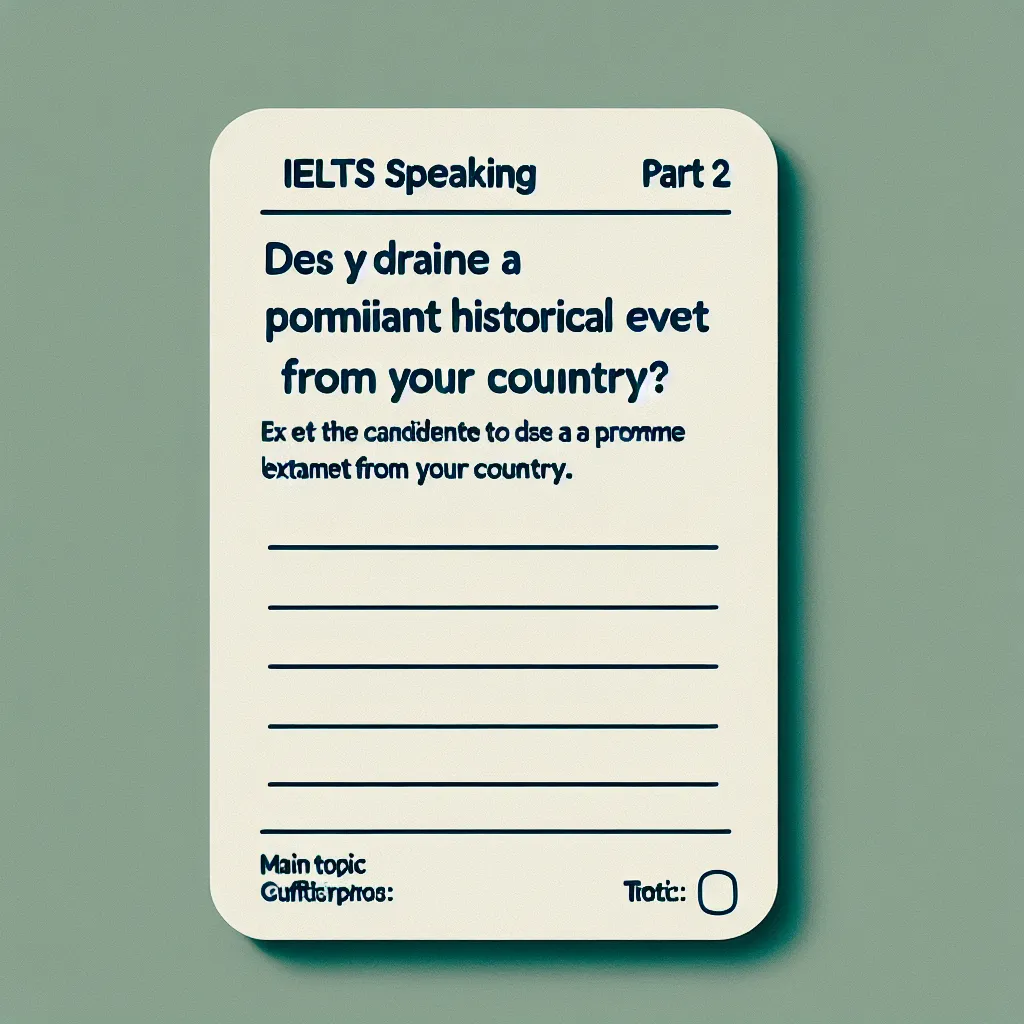Are you preparing for the IELTS Speaking test and wondering how to effectively describe a famous historical event from your country? This comprehensive guide will provide you with valuable insights, sample answers, and expert tips to help you excel in this particular topic. As an experienced IELTS examiner, I’ll walk you through each part of the speaking test, focusing on the theme of describing a famous historical event.
Nội dung bài viết
- Understanding the IELTS Speaking Test Structure
- Part 1: Introduction and Interview
- Sample Question 1: Do you like learning about history?
- Sample Question 2: What’s the most important historical event in your country, in your opinion?
- Part 2: Individual Long Turn
- Cue Card
- Sample Answer (Band 8-9)
- Examiner’s Follow-up Questions
- Part 3: Two-way Discussion
- Question 1: How do you think the way historical events are remembered changes over time?
- Question 2: Do you think it’s important for a country to have national days to commemorate historical events? Why or why not?
- Key Vocabulary and Phrases for High Scores
- Tips from an IELTS Examiner
Understanding the IELTS Speaking Test Structure
Before we dive into the specifics, let’s briefly review the structure of the IELTS Speaking test:
- Part 1: Introduction and Interview (4-5 minutes)
- Part 2: Individual Long Turn (3-4 minutes)
- Part 3: Two-way Discussion (4-5 minutes)
Now, let’s explore how you can tackle questions related to famous historical events in each part of the test.
Part 1: Introduction and Interview
In this section, the examiner may ask you general questions about history and historical events. Here are some possible questions and sample answers:
Sample Question 1: Do you like learning about history?
Band 6-7 Answer:
Yes, I do enjoy learning about history. It’s interesting to understand how past events have shaped our present world. I particularly like reading about ancient civilizations and their contributions to modern society.
Band 8-9 Answer:
Absolutely! I find history utterly fascinating. There’s something incredibly compelling about delving into the past and understanding how various events and decisions have shaped the trajectory of our world. I’m particularly intrigued by the interconnectedness of historical events and how they continue to influence contemporary society and politics.
Sample Question 2: What’s the most important historical event in your country, in your opinion?
Band 6-7 Answer:
In my opinion, the most important historical event in my country was gaining independence. It marked the beginning of our nation’s journey as a sovereign state and has had a lasting impact on our culture and identity.
Band 8-9 Answer:
From my perspective, our country’s independence is undoubtedly the most pivotal historical event. This watershed moment not only marked the end of colonial rule but also ushered in a new era of self-governance and national identity. The repercussions of this event continue to reverberate through our political, social, and cultural fabric, shaping our national narrative and our place on the global stage.
Part 2: Individual Long Turn
In this section, you’ll be given a cue card with a topic and some bullet points. You’ll have one minute to prepare, then you’ll need to speak for 1-2 minutes on the topic. Here’s a sample cue card related to describing a famous historical event:
 IELTS Speaking Cue Card
IELTS Speaking Cue Card
Cue Card
Describe a famous historical event from your country that you find fascinating
You should say:
- What the event was
- When it happened
- Why it is considered important
- And explain why you find it fascinating
Sample Answer (Band 8-9)
I’d like to talk about the Fall of Saigon, a momentous event in Vietnamese history that I find utterly fascinating. This event, which took place on April 30, 1975, marked the culmination of the Vietnam War and the reunification of North and South Vietnam.
The Fall of Saigon is considered immensely significant for several reasons. Firstly, it brought an end to nearly two decades of conflict that had ravaged the country and caused immeasurable suffering. Secondly, it led to the reunification of Vietnam under a single government, fundamentally altering the nation’s political landscape. Lastly, it had far-reaching implications for global geopolitics, signaling the end of direct U.S. military involvement in Southeast Asia.
What I find particularly fascinating about this event is the profound impact it had on Vietnamese society and its lasting legacy. The Fall of Saigon represents a turning point in our nation’s history, symbolizing the resilience and determination of the Vietnamese people. It’s captivating to consider how this single event set in motion a series of changes that continue to shape Vietnam’s development and international relations to this day.
Moreover, the dramatic scenes of the evacuation of Saigon, captured in iconic photographs, serve as a poignant reminder of the human cost of war and the desperation of those caught in its final moments. These images have become etched in the collective memory of not just Vietnamese people, but people around the world.
In essence, the Fall of Saigon is a testament to the complex interplay of historical forces and human experiences. It’s an event that continues to provoke thought and discussion, making it an endlessly fascinating subject for historical study and reflection.
Examiner’s Follow-up Questions
- How do you think this event has influenced your country’s relationship with other nations?
- Do you believe historical events like this should be taught in schools? Why or why not?
Band 8-9 Sample Answers:
-
The Fall of Saigon has undeniably had a profound impact on Vietnam’s international relations. In the immediate aftermath, it led to a period of isolation from Western countries, particularly the United States. However, over time, there has been a gradual reconciliation. Today, Vietnam has fostered diplomatic ties with many nations, including former adversaries. This event has taught us the importance of diplomacy and cooperation, influencing our approach to foreign policy. It’s fascinating to see how time has transformed historical animosities into opportunities for collaboration and mutual understanding.
-
I firmly believe that events like the Fall of Saigon should be taught in schools. Historical events of this magnitude provide crucial context for understanding the present. They offer valuable lessons about conflict resolution, the consequences of war, and the importance of peace. Moreover, teaching such events promotes critical thinking as students analyze different perspectives and learn to draw their own conclusions. It’s essential for younger generations to understand their country’s history to foster a sense of national identity while also developing empathy and a broader worldview.
Part 3: Two-way Discussion
In this section, the examiner will ask you more abstract questions related to the topic. Here are some potential questions and sample answers:
Question 1: How do you think the way historical events are remembered changes over time?
Band 6-7 Answer:
I think the way historical events are remembered can change as new information comes to light or as society’s values change. What was once seen as a victory might later be viewed differently. Also, different generations might have different perspectives on the same event.
Band 8-9 Answer:
The perception and interpretation of historical events are inherently dynamic, subject to constant evolution over time. This metamorphosis in historical memory can be attributed to several factors. Firstly, the emergence of new evidence or previously undisclosed information can dramatically alter our understanding of past events. Secondly, shifts in societal values and norms can lead to a reexamination of historical narratives, often resulting in a more nuanced or critical perspective. Additionally, the passage of time itself can provide a degree of emotional distance, allowing for more objective analysis.
Moreover, each generation tends to reinterpret history through the lens of their own experiences and contemporary issues. This process of recontextualization ensures that historical events remain relevant and continue to inform current debates and decision-making. It’s a testament to the enduring power of history that events from decades or even centuries ago can still provoke passionate discussion and shape our understanding of the present.
Question 2: Do you think it’s important for a country to have national days to commemorate historical events? Why or why not?
Band 6-7 Answer:
Yes, I think it’s important to have national days to remember historical events. These days help people learn about their country’s history and feel a sense of unity. They also provide an opportunity to reflect on the past and think about the future.
Band 8-9 Answer:
I firmly believe that national commemorative days play a vital role in preserving and promoting a country’s historical consciousness. These occasions serve multiple important functions. Firstly, they act as collective mnemonic devices, ensuring that significant historical events remain alive in the public memory. This is crucial for maintaining a sense of national identity and cultural continuity.
Secondly, commemorative days provide valuable opportunities for intergenerational dialogue and the transmission of historical knowledge. They create a space for older generations to share their experiences and perspectives with younger ones, fostering a deeper understanding of the nation’s journey.
Moreover, these days often prompt national reflection on past achievements and challenges, potentially informing current policy decisions and future aspirations. They can also serve as catalysts for public discourse on important issues related to the commemorated events, promoting critical thinking and civic engagement.
However, it’s important to note that the manner of commemoration is crucial. It should be balanced and inclusive, acknowledging different perspectives and avoiding the glorification of conflict. When done thoughtfully, national commemorative days can strengthen social cohesion, promote historical literacy, and contribute to a shared sense of national purpose.
Key Vocabulary and Phrases for High Scores
To achieve a high band score in your IELTS Speaking test, it’s crucial to use a wide range of vocabulary and complex sentence structures. Here are some key terms and phrases related to historical events that can help elevate your responses:
-
Watershed moment /ˈwɔːtəʃed ˈməʊmənt/ (noun): A critical turning point in history.
Example: “The invention of the printing press was a watershed moment in the spread of knowledge.” -
Pivotal /ˈpɪvətl/ (adjective): Of crucial importance in relation to the development or success of something else.
Example: “The Battle of Gettysburg played a pivotal role in the American Civil War.” -
Ramifications /ˌræmɪfɪˈkeɪʃnz/ (noun): The consequences of an action or event, especially when complex or unwelcome.
Example: “The ramifications of World War II were felt for decades after the conflict ended.” -
Reverberate /rɪˈvɜːbəreɪt/ (verb): To have continuing and serious effects.
Example: “The effects of the Industrial Revolution continue to reverberate through modern society.” -
Catalyst /ˈkætəlɪst/ (noun): A person or thing that precipitates an event or change.
Example: “The assassination of Archduke Franz Ferdinand acted as a catalyst for World War I.” -
Paradigm shift /ˈpærədaɪm ʃɪft/ (noun): A fundamental change in approach or underlying assumptions.
Example: “The theory of evolution represented a paradigm shift in our understanding of biology.”
Using these terms accurately and in context will demonstrate your advanced vocabulary and understanding of historical concepts, potentially boosting your band score.
Tips from an IELTS Examiner
As an experienced IELTS examiner, here are my top tips for excelling in the Speaking test, particularly when discussing historical events:
-
Prepare, don’t memorize: While it’s good to be familiar with key historical events, avoid memorizing entire answers. Examiners can easily detect rehearsed responses.
-
Use a range of tenses: When discussing historical events, practice using past tenses accurately, including past simple, past continuous, and past perfect.
-
Develop your ideas: Don’t just state facts. Explain why events are important and how they’ve influenced the present.
-
Be specific: Use dates, names, and specific details to add credibility to your answers.
-
Practice linking words: Use words like “however,” “moreover,” and “consequently” to connect your ideas smoothly.
-
Show enthusiasm: Demonstrating genuine interest in the topic can positively impact your fluency and pronunciation scores.
-
Stay calm if you don’t know: If you’re asked about an event you’re not familiar with, it’s okay to say so. You can then talk about a different historical event you do know about.
Remember, the IELTS Speaking test is not just about your knowledge of history, but about your ability to communicate effectively in English. Focus on expressing your ideas clearly and confidently, and you’ll be well on your way to achieving a high band score.
For more tips on acing your IELTS Speaking test, you might find it helpful to read about describing a famous scientist from your country or a place in your country known for its food. These topics can help you practice discussing various aspects of your country’s culture and history.


